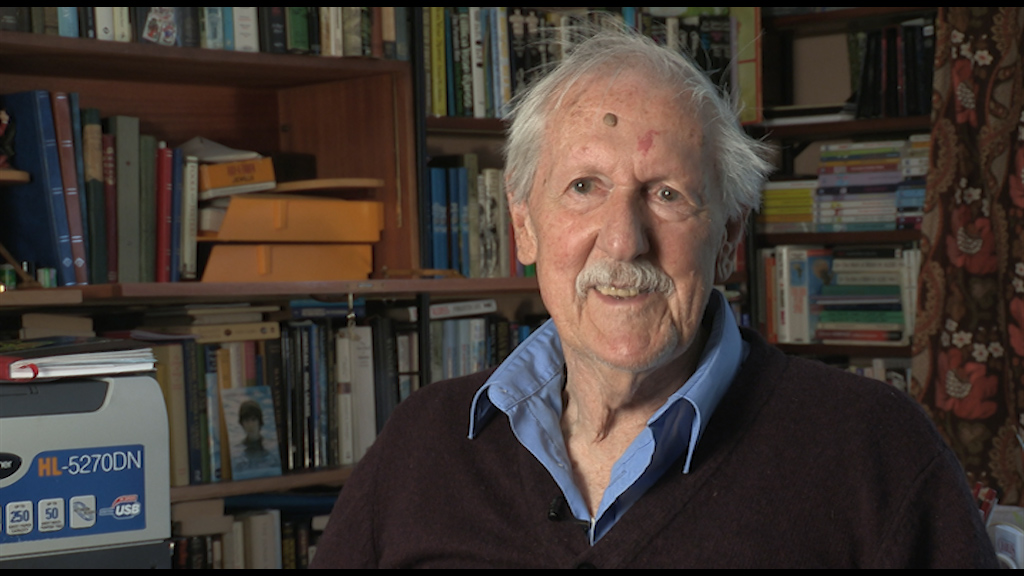NEXT STORY

Elements of culture in the midst of war
RELATED STORIES

NEXT STORY

Elements of culture in the midst of war
RELATED STORIES


|
Views | Duration | |
|---|---|---|---|
| 21. Breakfast on the move | 39 | 02:06 | |
| 22. The doorway of Burma | 45 | 02:34 | |
| 23. The Royal Signals' lot in Burma | 54 | 03:22 | |
| 24. Encountering the wildlife of Burma | 43 | 04:27 | |
| 25. Elements of culture in the midst of war | 44 | 03:37 | |
| 26. The beginning of the end of the war | 53 | 02:39 | |
| 27. A dreary homecoming | 44 | 02:14 | |
| 28. The most terrifying day of my life | 100 | 04:50 | |
| 29. The biggest tree in the world | 1 | 52 | 05:02 |
| 30. Farewell to India | 1 | 57 | 03:23 |


Well, and so life went on, and there was a time when we were crossing the River Chindwin, and two of us were separated – we were always short of men in Signals – and so two of us were separated from the truck which was our HQ. And we had to work at night with what was then, I believe it was called a 22 Set – we hadn't yet got to the 19 Set, which was better – the 22 Set, okay. So, we'd work throughout the night and we would be absolutely alone in the wilderness; they'd just drop us and then buzz off – collect us in the morning.
And so one of us would work an hour on, full scale, while the other one tried to sleep and then it would change over. And that was absolutely terrifying because, as you lay down to sleep, there was a perpetual rustling and scurrying. And, if it wasn't Japs you were afraid it was snakes which were rife, certainly. And endless birds hopping about, so it was really a terrifying, terrifying ordeal. And then you would do some… an hour's sending and so on, and so it went. And that was about the nastiest thing that happened, and fortunately no Japanese stumbled across us.
But at one place we were outside a place, possibly called Shwebo, but I can't really remember, but it was near Shwebo, and there we actually had a tent and that was really rather... very pleasant to have a tent, quite a long tent. And so there would be possibly eight people sleeping in there. And it was next to a village on the other side of a thicket, and a very tall... a very tall tree which bushed out a great deal at the top. And we were interested in what went on at the top, because we could see there were animals up there. And we didn't like that, I mean, any animal was bad news in Burma.
So, on this particular evening, I was lying in my charpoy in this tent, and one of these creatures came down the tree – you could hear it kind of crashing down. And it then... it stood in the entrance to the tent. I was the only one awake! I suppose I was the only one awake, and I could see this bloody thing, and it then steadily came into the tent. My God! Was it quite large and black in my memory, although I'm not sure that that's to be trusted. And there I lay, and it came… it came right opposite me and it looked at me, and I looked at it, and I couldn't get my rifle out – I didn't dare move. And so it looked and it looked, and then it thought, oh fuck, and it went off out the other way. That was extraordinary. It was my one encounter, actually, with animal life, I think, in Burma although we did see a few snakes we shot.
Brian Aldiss (1925-2017) was an English writer and anthologies editor, best known for his science fiction novels and short stories. He was educated at Framlingham College, Suffolk, and West Buckland School, Devon, and served in the Royal Signals between 1943-1947. After leaving the army, Aldiss worked as a bookseller in Oxford, an experience which provided the setting for his first book, 'The Brightfount Diaries' (1955). His first science fiction novel, 'Non-Stop', was published in 1958 while he was working as literary editor of the 'Oxford Mail'. His many prize-winning science fiction titles include 'Hothouse' (1962), which won the Hugo Award, 'The Saliva Tree' (1966), which was awarded the Nebula, and 'Helliconia Spring' (1982), which won both the British Science Fiction Association Award and the John W Campbell Memorial Award. Several of his books have been adapted for the cinema. His story, 'Supertoys Last All Summer Long', was adapted and released as the film 'AI' in 2001. His book 'Jocasta' (2005), is a reworking of Sophocles' classic Theban plays, 'Oedipus Rex' and 'Antigone'.
Title: Encountering the wildlife of Burma
Listeners: Christopher Sykes
Christopher Sykes is an independent documentary producer who has made a number of films about science and scientists for BBC TV, Channel Four, and PBS.
Tags: Burma, Royal Signals
Duration: 4 minutes, 27 seconds
Date story recorded: September 2014
Date story went live: 17 August 2015